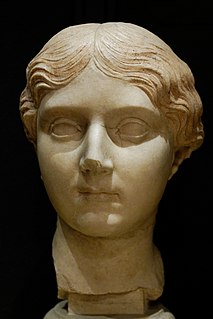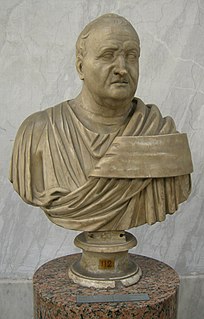Related Research Articles
80s BC is the time period from 89 BC – 80 BC.

This article concerns the period 109 BC – 100 BC.
Year 88 BC was a year of the pre-Julian Roman calendar. At the time it was known as the Year of the Consulship of Sulla and Rufus and the First Year of Houyuan. The denomination 88 BC for this year has been used since the early medieval period, when the Anno Domini calendar era became the prevalent method in Europe for naming years.

Gnaeus Domitius Ahenobarbus was a general and politician of ancient Rome in the 1st century BC.

Antonia the Elder was a niece of the first Roman emperor Augustus, being the eldest daughter of Octavia the Younger and her second husband the Triumvir Mark Antony. She married Lucius Domitius Ahenobarbus and became the maternal grandmother of empress Messalina as well as paternal grandmother of the emperor Nero.

Gnaeus Domitius Ahenobarbus was a member of the imperial Julio-Claudian dynasty of Ancient Rome. Domitius was the son of Antonia Major. He married Agrippina the Younger and became the father of the Emperor Nero.
Gnaeus Domitius Ahenobarbus was the name of several Roman politicians:

Gaius Octavius was a Roman politician. He was an ancestor to the Roman Emperors of the Julio-Claudian dynasty. He was the father of the Emperor Augustus, step-grandfather of the Emperor Tiberius, great-grandfather of the Emperor Claudius, and great-great grandfather of the Emperors Caligula and Nero. Hailing from Velitrae, he was a descendant of an old and wealthy equestrian branch of the gens Octavia. At Rome his family was part of the wealthy plebeian caste, and not being of senatorial rank, he was a novus homo. His grandfather, Gaius Octavius, fought as a military tribune in Sicily during the Second Punic War. His father, Gaius Octavius, was a municipal magistrate who lived to an advanced age.
Gaius Marius "the Younger" was a Roman republican general and politician who became consul in 82 BC with Papirius Carbo. He fought in Sulla's civil war. He committed suicide that same year at Praeneste, after his defeat by Sulla and during the city's capture by Quintus Lucretius Afella.

Lucius Domitius Ahenobarbus was the son of consul Gnaeus Domitius Ahenobarbus and Aemilia Lepida. His mother was a paternal relative of the triumvir Marcus Aemilius Lepidus. His paternal grandmother was Porcia. Ahenobarbus married Antonia Major and through his son with her he became the grandfather of emperor Nero.
Gnaeus Domitius Ahenobarbus was a consul of Rome in 192 BC.
Gnaeus Domitius Ahenobarbus was tribune of the people in 104 BC. He was the son of Gnaeus Domitius Ahenobarbus, and brother of Lucius Domitius Ahenobarbus. The college of pontiffs elected him Pontifex Maximus in 103.
Quintus Poppaedius Silo was a leader of the Italian tribe of the Marsi and one of the leaders of the Italian rebels during the Social War against Rome. Poppaedius was called the 'heart and soul' of the rebellion. He was a friend of Marcus Livius Drusus the Younger.
Lucius Domitius Ahenobarbus, consul in 54 BC, was an enemy of Julius Caesar and a strong supporter of the aristocratic (Optimates) party in the late Roman Republic.
Quintus Fabius Maximus Allobrogicus, was a Roman statesman and general who was elected consul in 121 BC. During his consulship he fought against the Arverni and the Allobroges whom he defeated in 120 BC. He was awarded a triumph and the agnomen Allobrogicus for his victory over the Gauls.
This article concerns the period 99 BC – 90 BC.
Gnaeus Domitius Ahenobarbus, a politician of ancient Rome in the 1st century BC, was the son of Gnaeus Domitius Ahenobarbus, and brother of Lucius Domitius Ahenobarbus. He married Cornelia, daughter of Lucius Cornelius Cinna, who was consul in 87 BC.
The gens Domitia was a plebeian family at ancient Rome. The first of the gens to achieve prominence was Gnaeus Domitius Calvinus, consul in 332 BC. His son, Gnaeus Domitius Calvinus Maximus, was consul in 283, and the first plebeian censor. The family produced several distinguished generals, and towards the end of the Republic, the Domitii were looked upon as one of the most illustrious gentes.
References
- ↑ Smith, William (1867), "Ahenobarbus (5), Lucius Domitius", in Smith, William (ed.), Dictionary of Greek and Roman Biography and Mythology , 1, Boston: Little, Brown and Company, p. 85
- ↑ Cicero, Verr. 2.5.7.
- ↑ Valerius Maximus, vi. 3. § 5
- ↑ Appian B. C. i. 88
- ↑ Marcus Velleius Paterculus, ii. 26
- ↑ Orosius, v. 20